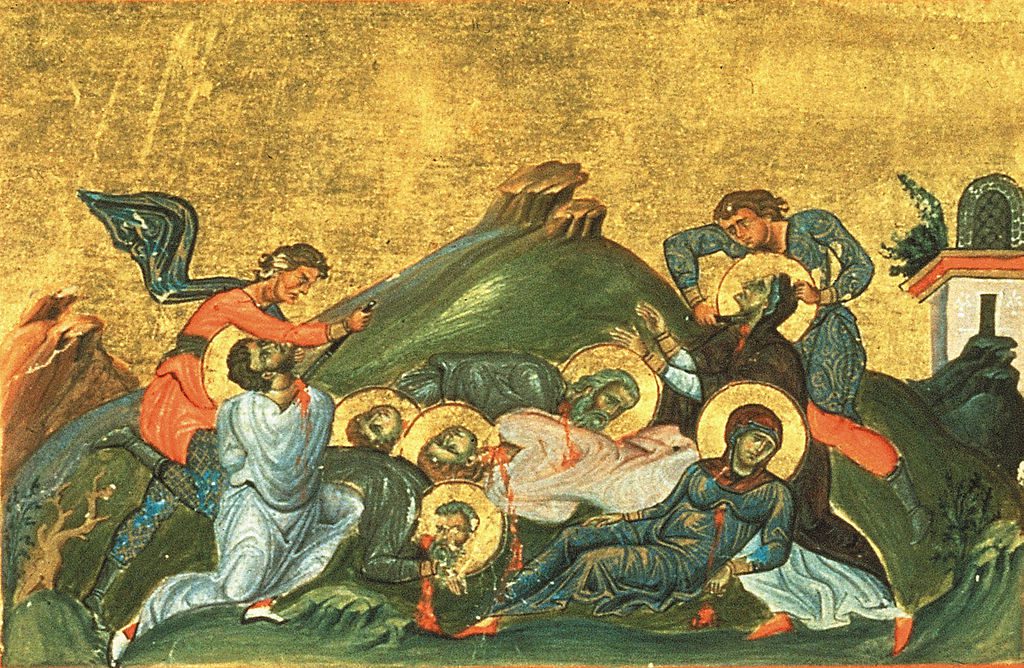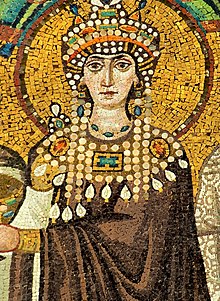If you were given two options to choose from, family or religion, which would you choose? It is a two-way road and it is a very narrow one, as both include sacrifices that most people would consider unthinkable. In the time of the Roman Empire, a faithful Christian woman by the name of Perpetua had to make this very decision, and it included her leaving behind a well-lived life, disownment, and imprisonment. The outcome of her passion led her to abandon a family and an infant child. Saint Perpetua was blessed with the honorable title of a martyr, as she held high her faith despite the consequences of claiming to follow Christianity.

Because Christianity was seen as a threat to the Roman Empire’s polytheistic religion, some of the early church’s followers faced imprisonment and in some cases, execution. One of the top crimes by the end of the first century was to claim that one was a Christian. Roman government officials grew suspicious of those who followed the Christian religion. They believed that Christians practiced gruesome things, such as ritual murder and incest. They believed that Christians were plotting against the Roman government. Aside from persecution and the chances of being arrested, early Christians faced many challenges, which included, disownment by their families, sacrifices, and disrespect from non-Christians.1

Vibia Perpetua, a young mother in her early twenties, was an early Christian arrested with a young group of catechumens, those who converted to the Christian faith. Her father had made many attempts to persuade her to disown her name as a Christian prior to her arrest. He had tormented her with many thoughts that only increased her anxieties of what was soon to come, but Perpetua’s love for God was stronger than her fears. She looked to her father, pointed to a vase, and said to him that, just like that object, she could not be called anything else other than what she was. In other words, she would proudly claim Christianity as her religion. Perpetua and the group were taken to prison. She sat constrained and afraid. Perpetua had never experienced such a place in her life. Her prior life outside of prison was full of opportunities; but now she was unable even to nurse her infant son, due to the separation. Once the group had moved to a more comfortable area of the prison, Perpetua spoke with her mother and brother, entrusting her son into their care. Although her fear of imprisonment in such a dark and gruesome place lingered, Perpetua felt a sudden burst of courage and did not mind being behind bars if it meant standing with her faith held high and God by her side. She knew the potential consequences of her actions and had visions of what the future held for her.2
Perpetua’s first vision was of a ladder that reached up to heaven, and God called to her from above, saying that He was waiting for her. However, He warned her of the serpent that sat on the ladder. The serpent waited to bite the ankle of those who climb up. In her vision, she fearlessly climbed the ladder knowing that nothing would stand between her and God. Through this vision, she knew that she would be martyred. Her second vision was of her brother Dinocrates, who had passed away at the age of seven because of a cancerous face tumor.3 In this vision, she saw that he was suffering, so she prayed for him. The following night, she had another vision in which he was well taken care of and was playing along with the other children of Heaven.4
The group was transferred to a military camp, where Perpetua had learned that they were sentenced to fight beasts in the arena. She had another vision that she and the group of Christian converts would not be fighting the wild animals held in the arena, though they were taking that form. She claimed that she was fighting the Devil and that she would be fighting a battle that she knew she would win, because she stood by her faith. In the military camp, the group had been treated harshly by guards. Perpetua looked them straight in the eye and told them about the glory they would have if the group were slaughtered while looking perfectly healthy. In hearing this, a banquet was thrown for the group to celebrate their last meal before their last moments, before their gruesome battle came into play. Still they were ridiculed for being Christians who would suffer the pain of wild beasts the following day.5
It was March 7, in 203 CE when they were scheduled to enter the arena in honor of the Emperor. The day and time had come for this group of Christians. They stood ready to face the beasts and chants of the Romans.6 The group was led to the arena where the many beasts awaited their arrival. At first, they were almost forced to dress in costumes of the Pagan gods and goddesses of Rome. Perpetua led the group of catechumens out of love for her Christian faith and refused to be submissive to the Romans’ demands.7 The beasts were released and the group of Christians met their end.

Alongside the group of those sent to the arena, Perpetua was accompanied by her slave, Felecity, who gave birth before being sent to fight the wild animals. Felecity was mentioned in Perpetua’s diary entries and the two women were supportive of each other. Like Perpetua, Felecity feared for her newborn daughter.8 Although she shared a mother’s fear for her child’s sake, Felecity’s next worry was that she would not be executed along with the group of Christians, because she was pregnant. It was rare for women to be executed, but the execution of an expecting mother was not allowed at all. If Felecity were to suffer from such a fate, she wanted to die and experience martyrdom with the rest of the young catechumens, who were dying for their faith,and not die alongside criminals who were being executed for having done wrong and committing crimes.9
The execution of women in the Roman Empire was extremely rare. For women from a higher status and education, such as Perpetua, it was even more rare.10 Vibia Perpetua had descended from a family with a great reputation and she had been raised with a strong education, which could be seen in her diaries of her last days in prison and before her martyrdom. She could have had the chance to watch her son grow up by renouncing her faith. She could have brought a good name to her family by turning to the Pagan religion. She could have pleased her father, who had begged her endlessly to denounce her faith in Christ. She could have said no to martyrdom and turned her face away from the thought of being called a Christian. She could have given into fear. She could have lived her life. She could have died old and not in her twenties, in an arena full of people and wild beasts thrashing and mocking her for her love for the Lord. She knew she could have stepped down, but she willingly stepped up. The fact that Saint Perpetua had suffered her fate so willingly shows that although she had given up a great life-style and opportunities that a majority of people would consider worth living for, it was worth it in her eyes to stand loyal to what she believed in. Perpetua wanted nothing more than to be called a Christian, and her passion for God and Christianity illustrates an image of how powerful love in the Christian faith can be. It takes a strong person, especially someone with a child, to lead a group of people in that situation and stand up for something so valuable.
- Erwin Goodenough, The Church In the Roman Empire (New York: Henry Holt and Company, 1931), 38. ↵
- Smith R. Scott and Christopher Francese, Ancient Rome : An Anthology of Sources (Indianapolis: Hackett Publishing Company, 2014), 258-259. ↵
- New Catholic Encyclopedia (Vol 11. 2nd ed.), 2003, s.v. “Perpetua and Felicity, SS.,” by E. Hoade. ↵
- Smith R. Scott and Christopher Francese, Ancient Rome : An Anthology of Sources (Indianapolis: Hackett Publishing Company, 2014), 259-262. ↵
- Smith R. Scott and Christopher Francese, Ancient Rome : An Anthology of Sources (Indianapolis: Hackett Publishing Company, 2014), 262-264. ↵
- Smith R. Scott and Christopher Francese, Ancient Rome : An Anthology of Sources (Indianapolis: Hackett Publishing Company, 2014), 257. ↵
- Sarah Gallick, The Big Book of Women Saints (San Francisco: Harper Collins, 2007), 77. ↵
- Encyclopedia of Children and Childhood: In History and Society (Vol. 2), 2004, s.v. “Perpetua, Saint,” by Susanna Elm. ↵
- Smith R. Scott and Christopher Francese, Ancient Rome : An Anthology of Sources (Indianapolis: Hackett Publishing Company, 2014), 263. ↵
- Encyclopedia of Children and Childhood: In History and Society (Vol. 2), 2004, s.v. “Perpetua, Saint,” by Susanna Elm. ↵



30 comments
Madeline Emke
I truly loved this article and St. Perpetua’s story. I never truly knew her story, but I did know of her and her martyrdom. I am deeply impressed by her courage to stand by her faith, even if that meant leaving her newborn child behind. I am also impressed by the bond of friendship and faith between Perpetua and Felicity, her slave, because I thought they were two women who just experienced the same fate. This article opened my eyes to the true story of Sts. Perpetua and Felicity.
Hali Garcia
St. Perpetua’s story is one of my favorites and you did an amazing job tell her story. It breaks my heart that she had to choose between her baby and her faith and it is something that I would not be able to do. I admire her bravery and faith because she truly believed God would be by her side and accepted her fate. I really enjoyed how you added St. Felicity too because when I first learned about St. Perpetua, I was shocked that St. Felicity was with her too.
David Castaneda Picon
This was a great article to read, I had never heard about Perpetua before. I really admire the way she think, she never doubted about her faith and so she had the courage to face death. It really amazes me how brave she was. It really takes a lot of courage and belief to do what she did, she preferred to die having a strong faith and great relationship with God, whichI think it was more bigger than stood for herself.
Raul Colunga
Great article and well written, I have never heard of Saint Perpetua before so I’m glad that I got to read about her history and what she went through. Saint Perpetua’s strong faith is inspiring and her courage to never back down. Many people could have not done what she did (myself included), but she stood for something bigger than herself.
Vanessa Barron Ortiz
Perpetua portrayed bravery through out this article. It amazes me how secure she was within her self and her faith to leave everything behind. It takes a substantial amount of belief in something to sacrifice all that you thought at one point to be important. Her devotion to Christianity is admirable.
Giselle Garcia
Perpetua’s decision to stick to her faith, knowing that she would die for it, and not accepting a pagan religion even though it would save herself and her child wouldn’t lose a mother, is very humbling to read. Perpetua had a tremendous amount of courage and trust in her faith, even as she was told to suppress it, showing her relationship with God is the most important thing for her. Her actions embody what it means to be a Christian, keeping her belief in God no matter what obstacles came her way.
Nathan Alba
I think this article goes into detail very well on describing how Perpetua had the extreme and utter courage to withstand such an empire at the time. I think this is an interesting case and shows the absolute devotion a true woman of faith has. It is unfortunate (as is with every case of martyrdom) that an individual will be subject to such persecution simply based off of his/her beliefs. Very interesting read overall.
Malik Heard
I am astonished to think that she kept her faith in the face of death and everything that happened.She stayed a devote believer in her faith and fought tooth and nail to keep it.I admire her for her strong conviction and faith because I don’t know if I would be able to do what she had done.Especially choosing her faith over her own family. This article was a very interesting read and really captured my attention.
Kimberly Parker
Perpetua’s ability to stand by her faith despite the consequences of doing so is very interesting. She had so much courage, owning up to the fact that she was indeed a Christian instead of saying she wasn’t like her father wanted her to, and the fact that she kept her courage when facing death is admirable. She kept her faith when others told her to hide it.
Charli Delmonico
I am very impressed with Perpetua’s ability to stand by her faith despite the consequences of doing so. I admire her courage even when facing her death, and I also admire that her faith never faltered. It would have been so easy for her to simply claim that she is not a Christian like her father wanted her to do, but she chose to cubically show that her faith and relationship with God is more important than the pain that comes along with dying in an arena.